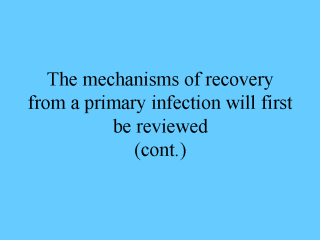| front |1 |2 |3 |4 |5 |6 |7 |8 |9 |10 |11 |12 |13 |14 |15 |16 |17 |18 |19 |review |
 |
Specific
immunity. The strength of the immune response is related to virus replication which is why live virus vaccines have to replicate enough to cause immunity but not enough to cause disease. Tc and Th cells and IgM start at 3-6 days. High affinity IgG and locally -secreted IgA start at 7-10 days. Tc have a pivotal role in virology because they can kill virus-infected cells before progeny virus has been assembled. They bind to peptides which are carried to the cell surface by MHC molecules by 3 hours after infection. Helper T cells produces cytokines which are essential for IgG and Tc development. In uncontrolled persistent infections they can cause immune complex disease eg Visna Maedi. Cytotoxic and helper T cells are most numerous for several days and therefore have a short term function. Memory T (and B) cells which can become effectors within 1-2 days of restimulation are left behind. Antibody is produced from B cells for several months and controls viruses of most families by neutralisation. During neutralisation antibody attaches to the surface of the virus and prevents i)the attachment of virus to host cell receptors by steric hindrance ii) the uncoating of virus.iii) fusion. |